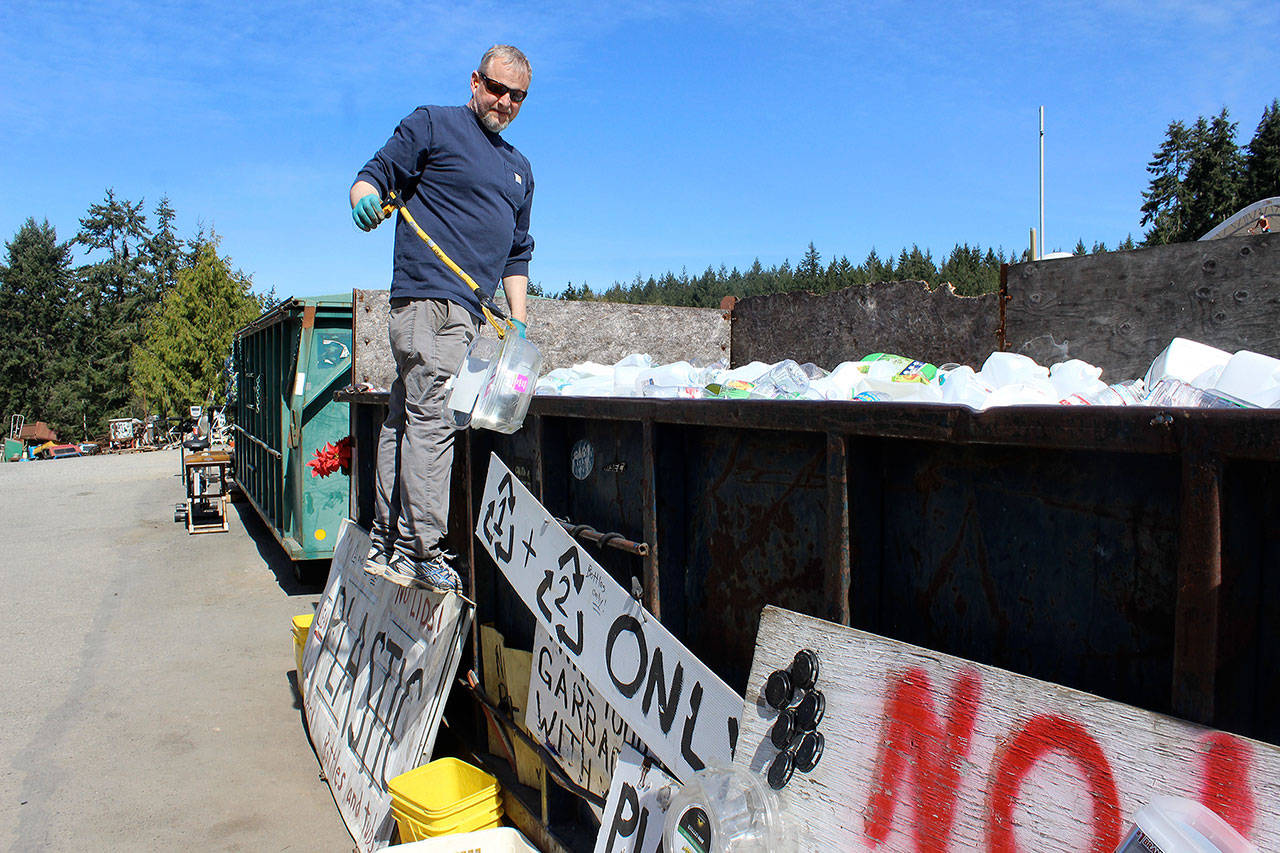Recycling on Whidbey Island is hard, confusing, appreciated, easy, better than most communities but not as good as Seattle.
It’s all those things and more.
Just ask Jill Campbell of Island Recycling. She’s heard every complaint, comment and conjecture there is about the state of recycling and still manages to laugh about it.
“Yes, I am personally responsible for China deciding to stop taking our (stuff),” she said, while stomping in a metal container of mixed paper Thursday at the sprawling Freeland facility. “That’s what I feel like telling people sometimes. Ecofreaks, they were all happy it was going to China. Well guess what? China has no environmental controls. How’s that better?”
Ever since China made good on its threat to stop taking shiploads of plastic, cardboard, newspaper and other recyclable materials from the United States that it deemed contaminated, communities have been scrambling to find buyers for some of the tons of waste that consumers toss in the re-use bins with the best of intentions.
Sometimes.
“We have everything labeled,” said Virginia Walton, who works at the Coupeville transfer station of Island Recycling. “Newspapers go here; cardboard over there; glass, aluminum, plastic are all labeled. Still, people throw everything in the same bin. It’s so annoying.”
Workers at recycling hubs say they have to keep a constant eye on the bins as they fill and pick out items that shouldn’t be there.
They can’t take clam shell containers used for lettuce or yesterday’s take-out salad, and they really don’t want your household trash.
“They throw their garbage in with their recycling sometimes,” Walton said. “One time in the newspaper bin, I found a bag of tossed kitty litter. I just wish people would just respect what we do.”
Which plastic containers can be recycled continues to vex some residents. In August, Island County stopped accepting plastics except those labeled No. 1 and No. 2, which include plastic bottles for water, juice and soda as well as opaque milk jugs.
The containers must be cleaned and lids and caps removed.
“I don’t have a big enough board to display all the plastic containers we don’t accept,” Walton said. “Just remember, we only take No. 1’s, No. 2’s, bottles and jugs.”
The restriction applies to people in unincorporated parts of the county who bring their own recyclables to county facilities. The county contracts out with Island Recycling, a private firm, which separates, bundles and sells to various outlets.
But the market continues to shrink for raw recycled materials.
“We live in fear that we won’t have a place to haul our plastic,” Campbell said.
Heather Trim with Zero Waste Washington told a packed audience last week at a Bayview Cash Store lecture that tons of recyclable materials are sitting, waiting for buyers.
“We are in a recycling crisis right now in the United States and in this region,” she said.
The majority of Whidbey recyclers are respectful, bring in cleaned containers and are pleasant, workers at transfer stations said.
They even go out of their way to do the right thing.
“There’s one elderly man who comes in a taxi and recycles,” Walton said. “Ever since his wife took away his keys, he’s here in a taxi every couple of weeks.”
Educating the masses about the do’s and don’ts of recycling is the goal of Sara Bergquist with Waste Wise, a program of WSU Extension Island County.
Thursday, she gave a presentation called “What’s Happening with Recycling?” that about 20 people attended at the Freeland Library.
Bergquist explained China’s National Sword decision banned two dozen types of materials and set the acceptable contamination level of incoming goods at 0.03 percent.
Contamination is when food waste or the wrong type of material is mixed in with a bundle of material.
“The United States’ level of contamination is about 25 percent,” Bergquist said.
West Coast communities depended heavily on shipping off recyclable goods to China and now “we have to find a new place to put plastics, papers, metals,” Bergquist explained, showing a map of countries that accepted the material — India, Malaysia, Thailand — until, they, too, were overwhelmed.
“We didn’t develop much of an infrastructure for dealing with our own recycling,” she said. “It’s forced us, like nothing else could, to think about other ways we can use our paper and plastic.”
Empty, clean and dry — that’s what containers need to be before being tossed into recycling bins.
No gross peanut butter or mayonnaise jars that haven’t been soaked and cleaned out, no pet food cans that haven’t been scraped, no soaked-in-grease pizza boxes.
“And when in doubt, throw it out,” Bergquist advised. “That’s abhorrent to us but it’s better than a whole container getting refused.”
Finally, ask questions.
“The reasons many people give for not recycling is they’re too busy, it’s too confusing and they’re too embarrassed to ask questions,” said Bergquist. “But the workers at the recycling transfer stations are there to help you. They want you to ask questions because after you leave, they’ll have to go through and take stuff out.”
• For more information: www.recyclewhidbey, https://extension.wsu.edu/island/nrs/waste-wise/


